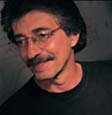 From big lizards to astrocytomas Add Peter Cala's name to the list of people who have never had cancer but who nonetheless have felt its wounding presence. The UC Davis physiologist and basic science researcher lost a friend and mentor to brain cancer in August 1998. Now, his quest to understand the relationship between ion transport and cell metabolism has taken on a personal tenor. Lazaro J. Mandel, a professor of physiology at the Duke University Medical Center, died of an astrocytoma, a type of glioma that affects cells known as astrocytes. "He had an inoperable tumor," says Cala, who completed his postdoctoral fellowship at Duke University under Mandel's sponsorship. "He was only 58." Brain tumors are among the most lethal and difficult cancers to treat. They're seldom diagnosed until they have grown to an advanced state, and their location makes surgery problematic. And they're on the rise. For reasons scientists can't explain, the number of brain tumors being diagnosed annually have doubled in the last 10 years, from 50,000 to 100,000. About 20 percent of brain tumors are primary tumors; the rest are secondary (metastatic) growths seeded by cancer cells floating in the bloodstream.
Home |
Table of Contents |
To our Readers |
Building on Basics UC Davis Health System | © 2000, 2001, 2002 UC Regents. All rights reserved. |
Peter Cala hopes that an enzyme that regulates sodium and hydrogen in cells will lead to new treatments for brain tumors |

